Four-day Science Communication Course
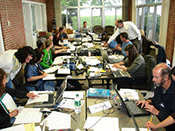 The Integration and Application Network staff conducted a four-day course in science communication on May 24-27, 2005 at the University of Maryland Center for Environmental Science (UMCES) Center Administration in Cambridge, Maryland. Course attendees included national and international scientists from the National Park Service, the National Oceanic & Atmospheric Administration, the Virginia Institute of Marine Science, the US Army Corps of Engineers, the Chesapeake Bay Program, Land-Ocean Interactions in the Coastal Zone, the Great Barrier Reef Marine Park Authority, and the University of Maryland Center for Environmental Science.
The Integration and Application Network staff conducted a four-day course in science communication on May 24-27, 2005 at the University of Maryland Center for Environmental Science (UMCES) Center Administration in Cambridge, Maryland. Course attendees included national and international scientists from the National Park Service, the National Oceanic & Atmospheric Administration, the Virginia Institute of Marine Science, the US Army Corps of Engineers, the Chesapeake Bay Program, Land-Ocean Interactions in the Coastal Zone, the Great Barrier Reef Marine Park Authority, and the University of Maryland Center for Environmental Science.
Two-day Science Communication Course
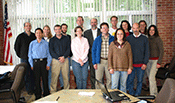 The Integration and Application Network staff conducted a short course in science communication on May 19-20, 2005 for Chesapeake Bay Program scientists. The course was conducted on the front porch of the University of Maryland Center for Environmental Science (UMCES) Center Administration in Cambridge, Maryland. In spite of a regional power blackout, science communication skills were developed and honed with the aid of an emergency generator. Course attendees included scientists from Maryland Department of Natural Resources, National Park Service, US Geological Survey, and UMCES.
The Integration and Application Network staff conducted a short course in science communication on May 19-20, 2005 for Chesapeake Bay Program scientists. The course was conducted on the front porch of the University of Maryland Center for Environmental Science (UMCES) Center Administration in Cambridge, Maryland. In spite of a regional power blackout, science communication skills were developed and honed with the aid of an emergency generator. Course attendees included scientists from Maryland Department of Natural Resources, National Park Service, US Geological Survey, and UMCES.
Science communication workshop in Bangkok, Thailand
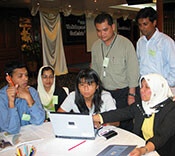 On September 12-14, Bill Dennison and Jane Thomas from the LOICZ (Land-Ocean Interactions in the Coastal Zone). The 34 participants were coastal scientists and resource managers from 12 countries throughout south Asia and southeast Asia (India, Pakistan, Bangladesh, Sri Lanka, Thailand, Vietnam, Cambodia, Malaysia, Singapore, Japan, Indonesia, and the Philippines). The stimulating and successful workshop focused on conceptual diagrams, oral presentations, and posters.
On September 12-14, Bill Dennison and Jane Thomas from the LOICZ (Land-Ocean Interactions in the Coastal Zone). The 34 participants were coastal scientists and resource managers from 12 countries throughout south Asia and southeast Asia (India, Pakistan, Bangladesh, Sri Lanka, Thailand, Vietnam, Cambodia, Malaysia, Singapore, Japan, Indonesia, and the Philippines). The stimulating and successful workshop focused on conceptual diagrams, oral presentations, and posters.
Science Communication Course (3-7 April, 2006)
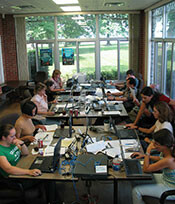 The Integration and Application Network will be conducting a course in communicating science effectively at the University of Maryland Center for Environmental Science Horn Point Campus in Cambridge, Maryland. The course will cover the elements of effective science communication, applied principles of layout design, production of conceptual diagrams, oral presentation techniques, website design and production principles. A new addition to this year's course is a section on effective techniques for integrated ecosystem assessment. The course structure includes a variety of common elements and a series of elective modules so it can be tailored to your needs. The hands-on approach means that participants come away from the course with the technical skills to effectively communicate their own data with a variety of science communication products. Further details and online registration are available on the course website.
The Integration and Application Network will be conducting a course in communicating science effectively at the University of Maryland Center for Environmental Science Horn Point Campus in Cambridge, Maryland. The course will cover the elements of effective science communication, applied principles of layout design, production of conceptual diagrams, oral presentation techniques, website design and production principles. A new addition to this year's course is a section on effective techniques for integrated ecosystem assessment. The course structure includes a variety of common elements and a series of elective modules so it can be tailored to your needs. The hands-on approach means that participants come away from the course with the technical skills to effectively communicate their own data with a variety of science communication products. Further details and online registration are available on the course website.
Communicating Science Effectively course
The next course in 'Communicating Science Effectively and Integrated Ecosystem Assessment' is to be held at the University of Maryland Center for Environmental Science in Cambridge, Maryland from the 3rd to 7th April, 2006.Register online now!Science communication course
 April 3–7, 2006, the IAN group held their “Science Communication and Integrated Assessment” course in the AREL building at the Horn Point campus. For the first time, this course included modules on performing and analyzing integrated ecosystem assessments. The participants included HPL graduate students and staff, as well as people from the Healthy Waterways Campaign (Australia), National Park Service (Virginia), Sonoran Institute (Arizona), Louisiana State University (Louisiana), and NOAA (Oxford, MD).
April 3–7, 2006, the IAN group held their “Science Communication and Integrated Assessment” course in the AREL building at the Horn Point campus. For the first time, this course included modules on performing and analyzing integrated ecosystem assessments. The participants included HPL graduate students and staff, as well as people from the Healthy Waterways Campaign (Australia), National Park Service (Virginia), Sonoran Institute (Arizona), Louisiana State University (Louisiana), and NOAA (Oxford, MD).
Erasmus Mundus - Science Communication Class
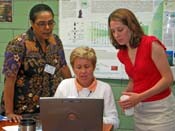 Erasmus Mundus Joint Master in Water and Coastal Management is an innovative program that integrates river-basin and coastal management, funded by the European Union. IAN staff Tim Carruthers and Jane Hawkey taught a one week unit on science communication and integrated ecosystem assessment in Faro, Portugal from May 8-12. The class consisted of 26 students from 18 countries with varied backgrounds including statistics, chemistry, and GIS, as well as biology. The diversity of experiences and backgrounds provided for rich discussions and diverse syntheses as well as an effective way to broadly disseminate tools for, and approaches to, science communication.
Erasmus Mundus Joint Master in Water and Coastal Management is an innovative program that integrates river-basin and coastal management, funded by the European Union. IAN staff Tim Carruthers and Jane Hawkey taught a one week unit on science communication and integrated ecosystem assessment in Faro, Portugal from May 8-12. The class consisted of 26 students from 18 countries with varied backgrounds including statistics, chemistry, and GIS, as well as biology. The diversity of experiences and backgrounds provided for rich discussions and diverse syntheses as well as an effective way to broadly disseminate tools for, and approaches to, science communication.
Science communication course
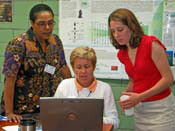 June 7–8, 2006, the IAN group conducted the two day version of their "Science Communication and Integrated Assessment" course at the Cooperative Oxford Laboratory. The participants included staff and students from MD DNR Fisheries Service, NOAA Chesapeake Bay Office, NOAA's National Ocean Service, and the Cooperative Oxford Laboratory.
June 7–8, 2006, the IAN group conducted the two day version of their "Science Communication and Integrated Assessment" course at the Cooperative Oxford Laboratory. The participants included staff and students from MD DNR Fisheries Service, NOAA Chesapeake Bay Office, NOAA's National Ocean Service, and the Cooperative Oxford Laboratory.
Communicating Science Effectively: A Practical Handbook for Integrating Visual Elements
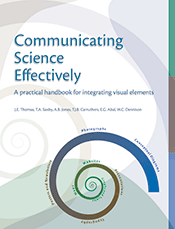 IAN has just published its first book, based on the content of our Science Communication Course. It includes an introduction to the principles of science communication–what effective science communication is, why it is important, and how to do it. The principles include how effective science communication can change societal paradigms and make one a better scientist. General principles relating to all science communication products include providing synthesis, visualization, and context, assembling self-contained visual elements such as photos, maps, conceptual diagrams and data, formatting content to define and simplify terms, and eliminating jargon and acronyms. Techniques and principles for communicating in different media–desktop publishing (including posters and newsletters), presentations and websites–are outlined. Finally, a case study is presented to illustrate how effective science communication has become an integral part of a successful environmental science, monitoring, planning, and implementation program.
IAN has just published its first book, based on the content of our Science Communication Course. It includes an introduction to the principles of science communication–what effective science communication is, why it is important, and how to do it. The principles include how effective science communication can change societal paradigms and make one a better scientist. General principles relating to all science communication products include providing synthesis, visualization, and context, assembling self-contained visual elements such as photos, maps, conceptual diagrams and data, formatting content to define and simplify terms, and eliminating jargon and acronyms. Techniques and principles for communicating in different media–desktop publishing (including posters and newsletters), presentations and websites–are outlined. Finally, a case study is presented to illustrate how effective science communication has become an integral part of a successful environmental science, monitoring, planning, and implementation program.
University of Florida Science Communication Course
 On July 20 and 21, the Integration and Application Network conducted a Science Communication course at the University of Florida in Gainesville. The 14 course participants came from organizations such as the University of Florida's Institute of Food and Agricultural Sciences Extension, Florida Sea Grant, Florida Department of Environmental Protection, Southwest Florida Regional Planning Council, Citrus County Board of County Commissioners, and Charlotte County. Participants plan to use their new skills to promote public awareness and activism.
On July 20 and 21, the Integration and Application Network conducted a Science Communication course at the University of Florida in Gainesville. The 14 course participants came from organizations such as the University of Florida's Institute of Food and Agricultural Sciences Extension, Florida Sea Grant, Florida Department of Environmental Protection, Southwest Florida Regional Planning Council, Citrus County Board of County Commissioners, and Charlotte County. Participants plan to use their new skills to promote public awareness and activism.
Littoral 2006 Conference
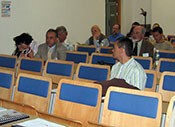 On September 18-20, Jane Thomas from the IAN group traveled to Gdansk, Poland, to attend the Littoral 2006 conference, and participate in a LOICZ (Land Ocean Interactions in the Coastal Zone) workshop. As part of the workshop, which presented the various tools used by LOICZ, Jane gave a lecture on the use of conceptual diagrams in science communication, and led the group in an exercise where they drew their own conceptual diagrams.
On September 18-20, Jane Thomas from the IAN group traveled to Gdansk, Poland, to attend the Littoral 2006 conference, and participate in a LOICZ (Land Ocean Interactions in the Coastal Zone) workshop. As part of the workshop, which presented the various tools used by LOICZ, Jane gave a lecture on the use of conceptual diagrams in science communication, and led the group in an exercise where they drew their own conceptual diagrams.
ISBW 7 Conference 2006
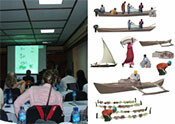 On September 10-15, Tim Carruthers from the IAN group attended the seventh International Seagrass Biology Workshop (ISBW7) in Zanzibar, Tanzania. Tim gave a presentation on work being carried out with an NCEAS (National Center for Ecological Analysis and Synthesis) project on Global Seagrass Trajectories, entitled “A Global Crisis for Seagras Ecosystems?”. He also gave a short workshop on techniques in effective science communication.
On September 10-15, Tim Carruthers from the IAN group attended the seventh International Seagrass Biology Workshop (ISBW7) in Zanzibar, Tanzania. Tim gave a presentation on work being carried out with an NCEAS (National Center for Ecological Analysis and Synthesis) project on Global Seagrass Trajectories, entitled “A Global Crisis for Seagras Ecosystems?”. He also gave a short workshop on techniques in effective science communication.
Science Communication Course (23-27 April, 2007)
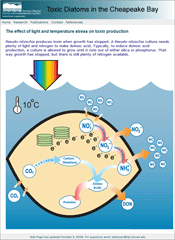 The Integration and Application Network will be conducting a course in communicating science effectively at the Annapolis Synthesis Center in Annapolis, Maryland. The course will cover the elements of effective science communication, applied principles of layout design, production of conceptual diagrams, oral presentation techniques, website design, and production principles. The course includes a section on effective techniques for integrated ecosystem assessment. The course structure includes a variety of common elements and a series of elective modules so it can be tailored to your needs. The hands-on approach means that participants come away from the course with the technical skills to effectively communicate their own data with a variety of science communication products. Further details and online registration are available on the course website.
The Integration and Application Network will be conducting a course in communicating science effectively at the Annapolis Synthesis Center in Annapolis, Maryland. The course will cover the elements of effective science communication, applied principles of layout design, production of conceptual diagrams, oral presentation techniques, website design, and production principles. The course includes a section on effective techniques for integrated ecosystem assessment. The course structure includes a variety of common elements and a series of elective modules so it can be tailored to your needs. The hands-on approach means that participants come away from the course with the technical skills to effectively communicate their own data with a variety of science communication products. Further details and online registration are available on the course website.
Course in Communicating Science Effectively
A reminder that the Integration and Application Network is conducting a 5 day course in communicating science effectively. The course is being held at the Annapolis Synthesis Center in Annapolis, Maryland, 23-27 April, 2007. The hands-on approach means that participants come away from the course with the technical skills to effectively communicate their own data with a variety of science communication products. Further details and online registration are available on the course website.Science Communication Course (IWA)
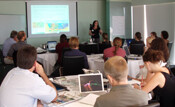 Jane Thomas from the Integration and Application Network conducted a four-day course on science communication in Brisbane, Australia, March 5-9, hosted by the International WaterCentre. The 18 participants were staff involved in the Reef Water Quality Partnership, an initiative of the Australian federal and Queensland state governments and regional natural resource management bodies supporting the Great Barrier Reef Water Quality Protection Plan. Co-instructors were Eva Abal and Emily Saeck from Healthy Waterways and Kate Moore from the University of Queensland.
Jane Thomas from the Integration and Application Network conducted a four-day course on science communication in Brisbane, Australia, March 5-9, hosted by the International WaterCentre. The 18 participants were staff involved in the Reef Water Quality Partnership, an initiative of the Australian federal and Queensland state governments and regional natural resource management bodies supporting the Great Barrier Reef Water Quality Protection Plan. Co-instructors were Eva Abal and Emily Saeck from Healthy Waterways and Kate Moore from the University of Queensland.
Science Communication Course
 April 23–27, 2007, the IAN group held their course in Communicating Science Effectively at the IAN Annapolis Synthesis Center in Annapolis, MD. For the first time, this course included a module on media training. The participants included staff from the Chesapeake Research Consortium (MD), Worcester County (MD), Environmental Protection Agency (LA), the Tampa Bay Estuary Program (FL) and the Environmental Protection Commission of Hillsborough (MD). Participants left the course with a wide range of new skills and a series of communication products including a conceptual diagram, and a newsletter, poster or website.
April 23–27, 2007, the IAN group held their course in Communicating Science Effectively at the IAN Annapolis Synthesis Center in Annapolis, MD. For the first time, this course included a module on media training. The participants included staff from the Chesapeake Research Consortium (MD), Worcester County (MD), Environmental Protection Agency (LA), the Tampa Bay Estuary Program (FL) and the Environmental Protection Commission of Hillsborough (MD). Participants left the course with a wide range of new skills and a series of communication products including a conceptual diagram, and a newsletter, poster or website.
Communicating Science Effectively handbook reviewed
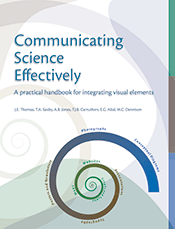 'Communicating Science Effectively: A Practical Handbook for Integrating Visual Elements' was published in August 2006. Based on the content of our Science Communication Course, it includes an introduction to the principles of science communication - what effective science communication is, why it is important, and how to do it. A recent review in Bulletin of Marine Science 80(2), 441-442 (March 2007) describes the handbook as a "...much needed and recommended addition to the library of any science student or professional, government agency or educational institution". The reviewer states that the authors have "...done a first-rate job explaining how good science communication requires attention to both the science and the presentation", and was "...delighted to see the many steps the authors took ... to make their case ... that good communication can actually make you a better scientist".
'Communicating Science Effectively: A Practical Handbook for Integrating Visual Elements' was published in August 2006. Based on the content of our Science Communication Course, it includes an introduction to the principles of science communication - what effective science communication is, why it is important, and how to do it. A recent review in Bulletin of Marine Science 80(2), 441-442 (March 2007) describes the handbook as a "...much needed and recommended addition to the library of any science student or professional, government agency or educational institution". The reviewer states that the authors have "...done a first-rate job explaining how good science communication requires attention to both the science and the presentation", and was "...delighted to see the many steps the authors took ... to make their case ... that good communication can actually make you a better scientist".
P/ICES New Frontiers in Marine Science Conference
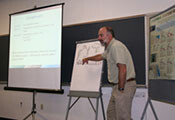 To encourage greater involvement of young scientists in international scientific investigations and to foster their involvement in the management of the marine environment, the International Council for the Exploration of the Sea (ICES) and the North Pacific Marine Science Organization (PICES) co-sponsored a conference for 107 Early Career Scientists from 19 countries in Baltimore, MD, 26-29 June, 2007. The local host was Elizabeth North from the Horn Point Laboratory and UMCES provided additional support. Jane Hawkey from IAN designed the logo and program, and organized logistics for the conference. Bill Dennison and Tim Carruthers from IAN conducted science communication and integrated assessment workshops.
To encourage greater involvement of young scientists in international scientific investigations and to foster their involvement in the management of the marine environment, the International Council for the Exploration of the Sea (ICES) and the North Pacific Marine Science Organization (PICES) co-sponsored a conference for 107 Early Career Scientists from 19 countries in Baltimore, MD, 26-29 June, 2007. The local host was Elizabeth North from the Horn Point Laboratory and UMCES provided additional support. Jane Hawkey from IAN designed the logo and program, and organized logistics for the conference. Bill Dennison and Tim Carruthers from IAN conducted science communication and integrated assessment workshops.
Science Communication Course at the Chesapeake Biological Laboratory
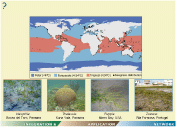 Dr. Margaret Palmer, Director of the Chesapeake Biological Laboratory (CBL), invited the Integration and Application Network to hold a one-day Science Communication course on July 12, 2007 in Solomons Island, Maryland. Nine participants from CBL gained hands-on experience using graphics software and developing conceptual diagrams and figures for various communications. This course introduced a newly-implemented activity, Title Pursuit, where participants create active, concise titles from the clues given to them in graphs and photos. In conjunction with another of our activities, Conceptionary, we will use this activity to help scientists practice the principles of effective science communication. Instructors for the course were Bill Dennison, Jane Hawkey, and Joanna Woerner.
Dr. Margaret Palmer, Director of the Chesapeake Biological Laboratory (CBL), invited the Integration and Application Network to hold a one-day Science Communication course on July 12, 2007 in Solomons Island, Maryland. Nine participants from CBL gained hands-on experience using graphics software and developing conceptual diagrams and figures for various communications. This course introduced a newly-implemented activity, Title Pursuit, where participants create active, concise titles from the clues given to them in graphs and photos. In conjunction with another of our activities, Conceptionary, we will use this activity to help scientists practice the principles of effective science communication. Instructors for the course were Bill Dennison, Jane Hawkey, and Joanna Woerner.
Course in Communicating Science Effectively
The Integration and Application Network is conducting a 5-day course in communicating science effectively. The course is being held in Annapolis, Maryland, 22-24 April, 2008. The hands-on approach means that participants come away from the course with the technical skills to effectively communicate scientific information in a variety of communication products. Further details and online registration are available on the course website.Course in Communicating Science Effectively
The Integration and Application Network science communication course has been revised for 22-24 April, 2008. The new format is a 2 or 3 day course to help accommodate those with limited time availability. The venue has returned to the Horn Point campus to allow for more work space and to give access to cheaper accommodation at the campus dorm. Further details and online registration are available on the course website.IAN staff lead a workshop to develop a report card for Central Kura Basin, South Caucasus
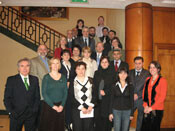 The Kura river runs through the Republic of Georgia, Armenia and Azerbaijan, eventually reaching the Caspian Sea. The South Caucasus Water Program, funded by USAID, has spent three years building collaborations between water quality monitoring efforts in the three countries. IAN staff spent a week working with the program and partners to produce a demonstration report card for the central Kura basin and also provide science communication training to participants from all three countries.
The Kura river runs through the Republic of Georgia, Armenia and Azerbaijan, eventually reaching the Caspian Sea. The South Caucasus Water Program, funded by USAID, has spent three years building collaborations between water quality monitoring efforts in the three countries. IAN staff spent a week working with the program and partners to produce a demonstration report card for the central Kura basin and also provide science communication training to participants from all three countries.
Science Communication Courses held at Horn Point and Charleston, SC
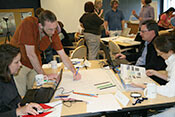 The Integration and Application Networks annual 'Effective Science Communication Course' was held from April 22-24 at the University of Maryland Center for Environmental Science's Horn Point Laboratory (HPL). Twelve students, staff and faculty from UMCES were joined by eight other participants from federal, state and private agencies, traveling from as far as Hawaii, Seattle and the Sonoran Desert. In addition to the annual HPL course, two additional courses were taught at the beginning of April in Charleston, South Carolina. A 1-day and a 2.5-day course were provided to over 20 NOAA Coastal Services Center and SC Department of Natural Resources staff. The courses provided an engaging opportunity to learn or further develop science communication skills. For future courses, please check the course website or email us to inquire about costs of a custom course.
The Integration and Application Networks annual 'Effective Science Communication Course' was held from April 22-24 at the University of Maryland Center for Environmental Science's Horn Point Laboratory (HPL). Twelve students, staff and faculty from UMCES were joined by eight other participants from federal, state and private agencies, traveling from as far as Hawaii, Seattle and the Sonoran Desert. In addition to the annual HPL course, two additional courses were taught at the beginning of April in Charleston, South Carolina. A 1-day and a 2.5-day course were provided to over 20 NOAA Coastal Services Center and SC Department of Natural Resources staff. The courses provided an engaging opportunity to learn or further develop science communication skills. For future courses, please check the course website or email us to inquire about costs of a custom course.
Science Communication Course for Chesapeake Bay Program staffers
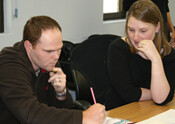 The Integration and Application Network taught their Communicating Science Effectively course to the Chesapeake Bay Program staffers on Tuesday April 29. Jane Thomas and Jane Hawkey, along with Bill Dennison, instructed the course to the 11 staffers in the Annapolis Synthesis Center. The staffers are participating in the three-year Chesapeake Research Consortium's Fellowship Program. The courses provided an engaging opportunity for the staffers to learn science communication skills and techniques. For future courses, please check the course website or email us to enquire about costs of a custom course.
The Integration and Application Network taught their Communicating Science Effectively course to the Chesapeake Bay Program staffers on Tuesday April 29. Jane Thomas and Jane Hawkey, along with Bill Dennison, instructed the course to the 11 staffers in the Annapolis Synthesis Center. The staffers are participating in the three-year Chesapeake Research Consortium's Fellowship Program. The courses provided an engaging opportunity for the staffers to learn science communication skills and techniques. For future courses, please check the course website or email us to enquire about costs of a custom course.
Conceptual Diagram workshop held at the Technical Communication Summit
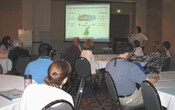 The Society of Technical Communication (STC) invited IAN to conduct a workshop at their 55th Annual Technical Communication Summit in Philadelphia, PA from June 1-4. Thirty-five conference attendees joined IAN science communicators Joanna Woerner and Caroline Wicks for a workshop called "Conceptual Diagrams: Tools for effective science communication." Professionals from the environmental science, medical, pharmaceutical, computer, financial, and engineering fields learned how to synthesize and integrate data through conceptual diagrams. This workshop, based on concepts presented in the "Effective Science Communication Course," consisted of a brief lecture, group discussion, and conceptionary—an interactive drawing exercise where participants practice using symbols to convey complex information.
The Society of Technical Communication (STC) invited IAN to conduct a workshop at their 55th Annual Technical Communication Summit in Philadelphia, PA from June 1-4. Thirty-five conference attendees joined IAN science communicators Joanna Woerner and Caroline Wicks for a workshop called "Conceptual Diagrams: Tools for effective science communication." Professionals from the environmental science, medical, pharmaceutical, computer, financial, and engineering fields learned how to synthesize and integrate data through conceptual diagrams. This workshop, based on concepts presented in the "Effective Science Communication Course," consisted of a brief lecture, group discussion, and conceptionary—an interactive drawing exercise where participants practice using symbols to convey complex information.
REU students trained in Science Communication
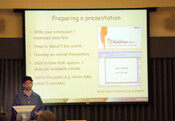 Students in the Research Experience for Undergraduates program (overseen by Maryland Sea Grant and funded by National Science Foundation) are now trained in Zen and the art of science communication. Students residing at both Horn Point Laboratory and Chesapeake Biological Laboratory met with Bill Dennison, Jane Thomas, Ben Fertig, and IAN intern Hilary Stevens at the Annapolis Synthesis Center to draw conceptual diagrams and improve visual aides using effective science communication techniques. Additionally, they were given a walking tour of Annapolis.
Students in the Research Experience for Undergraduates program (overseen by Maryland Sea Grant and funded by National Science Foundation) are now trained in Zen and the art of science communication. Students residing at both Horn Point Laboratory and Chesapeake Biological Laboratory met with Bill Dennison, Jane Thomas, Ben Fertig, and IAN intern Hilary Stevens at the Annapolis Synthesis Center to draw conceptual diagrams and improve visual aides using effective science communication techniques. Additionally, they were given a walking tour of Annapolis.
Science communication course for Riverkeepers
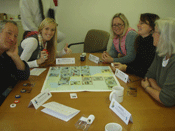 IAN has just finished teaching a course in science communication to a group of local riverkeepers and other environmental professionals. Participants represented organizations from areas such as the Sassafras River, the Rappahannock River, and Maryland's Coastal Bays. Many of the groups are developing their own ecosystem report cards so there was a special emphasis on synthesizing and integrating data. An addition to the course was the playing of the new IAN/SeaWeb board game TRADE-OFF!, teaching students about balancing conservation and real-world pressures, and the power of negotiation. We announce future courses via this eNewsletter, or you can email us to inquire about running a custom course.
IAN has just finished teaching a course in science communication to a group of local riverkeepers and other environmental professionals. Participants represented organizations from areas such as the Sassafras River, the Rappahannock River, and Maryland's Coastal Bays. Many of the groups are developing their own ecosystem report cards so there was a special emphasis on synthesizing and integrating data. An addition to the course was the playing of the new IAN/SeaWeb board game TRADE-OFF!, teaching students about balancing conservation and real-world pressures, and the power of negotiation. We announce future courses via this eNewsletter, or you can email us to inquire about running a custom course.
George Wright Society meeting in Portland, Oregon.
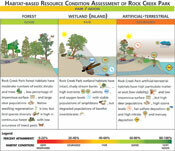 Bill Dennison and Tim Carruthers attended the George Wright Society conference in Portland, Oregon. Along with Shawn Carter, a National Park Service partner, they ran a "Communicating Science Effectively" workshop. There are a growing number of Science Communicators at the National Park Service and many of them attended the workshop. In addition, Tim Carruthers presented the recently completed Natural Resource Condition Assessment of Rock Creek Park which stimulated much discussion. Ken Burns and Dayton Duncan, historians and documentary producers, presented previews of a spectacular public television series on the history of national parks which will air in September 2009.
Bill Dennison and Tim Carruthers attended the George Wright Society conference in Portland, Oregon. Along with Shawn Carter, a National Park Service partner, they ran a "Communicating Science Effectively" workshop. There are a growing number of Science Communicators at the National Park Service and many of them attended the workshop. In addition, Tim Carruthers presented the recently completed Natural Resource Condition Assessment of Rock Creek Park which stimulated much discussion. Ken Burns and Dayton Duncan, historians and documentary producers, presented previews of a spectacular public television series on the history of national parks which will air in September 2009.
Teaching science communication to Erasmus Mundus students.
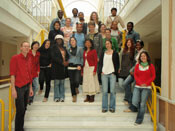 Erasmus Mundus is a European Union-funded MS program for students from around the globe. Students spend a semester in Plymouth, UK, a semester in Cadiz, Spain, and then a final semester doing a research project. The program has lecturers from around the globe who give a broad-based understanding of global resource and water management issues. In the first week of April, IAN's Tim Carruthers traveled to Cadiz, Spain, to present a module on Effective Science Communication.
Erasmus Mundus is a European Union-funded MS program for students from around the globe. Students spend a semester in Plymouth, UK, a semester in Cadiz, Spain, and then a final semester doing a research project. The program has lecturers from around the globe who give a broad-based understanding of global resource and water management issues. In the first week of April, IAN's Tim Carruthers traveled to Cadiz, Spain, to present a module on Effective Science Communication.
Science communication course at the University of New England
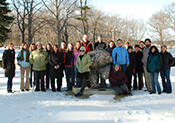 On January 12–13, Science Communicators Joanna Woerner and Emily Nauman presented a Science Communication course at the University of New England in Biddeford, Maine. Twenty-two professionals from organizations such as The University of New England, Wells Reserve, Maine Drinking Water Program, Maine Department of Environmental Protection, and Maine NEMO Program explored how to synthesize data in conceptual diagrams, presentations, and print documents. Participants left the course with drafts of science communication products describing a variety of topics including threats to drinking water, benefits of vegetated buffers, endangered species management, and household pollutant minimization. We look forward to seeing how they continue their outreach and communication efforts.
On January 12–13, Science Communicators Joanna Woerner and Emily Nauman presented a Science Communication course at the University of New England in Biddeford, Maine. Twenty-two professionals from organizations such as The University of New England, Wells Reserve, Maine Drinking Water Program, Maine Department of Environmental Protection, and Maine NEMO Program explored how to synthesize data in conceptual diagrams, presentations, and print documents. Participants left the course with drafts of science communication products describing a variety of topics including threats to drinking water, benefits of vegetated buffers, endangered species management, and household pollutant minimization. We look forward to seeing how they continue their outreach and communication efforts.
EBM Tools Network webinar on science communication
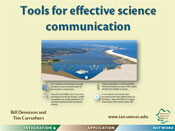 On September 30, Bill Dennison and Tim Carruthers presented a webinar on tools for science communication for the Ecosystem-Based Management Tools Network. Bill was also presenting to a live audience at the State of the Hudson River Watershed Conference in Hyde Park, NY. The web audience included participants from 23 US states and 12 countries, and was followed by a lively discussion on methods and approaches to science communication.
On September 30, Bill Dennison and Tim Carruthers presented a webinar on tools for science communication for the Ecosystem-Based Management Tools Network. Bill was also presenting to a live audience at the State of the Hudson River Watershed Conference in Hyde Park, NY. The web audience included participants from 23 US states and 12 countries, and was followed by a lively discussion on methods and approaches to science communication.
Science communication course for the Ohio Division of Wildlife
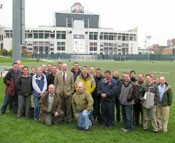 Bill Dennison and Emily Nauman taught a science communication course at Ohio State University (OSU) for a team from the Ohio Division of Wildlife. The group mentioned that one of their biggest challenges involves knowing how to talk to a diverse audience ranging from hunters and anglers to politicians. They came away from the two days with many new tools and approaches for communicating their message to different target audiences. Bill also gave a seminar to OSU students and faculty on ecosystem health report cards.
Bill Dennison and Emily Nauman taught a science communication course at Ohio State University (OSU) for a team from the Ohio Division of Wildlife. The group mentioned that one of their biggest challenges involves knowing how to talk to a diverse audience ranging from hunters and anglers to politicians. They came away from the two days with many new tools and approaches for communicating their message to different target audiences. Bill also gave a seminar to OSU students and faculty on ecosystem health report cards.
Science communication course in Canada
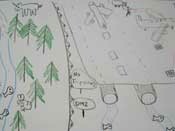 Bill Dennison (IAN) and Caroline Wicks (EcoCheck) headed to Toronto, Ontario on May 11th to teach a Science Communication Course with former EcoCheck employees, Ben Longstaff and Emily Nauman. Ben now works for Lake Simcoe Regional Conservation Authority, and arranged for IAN to teach the course to a variety of scientists and communication specialists from local conservation authorities. The 2-day course was taught at Black Creek Pioneer Village, and included lectures, hands-on activities, and software demonstrations. Some topics that participants work on are airplane de-icing impacts on local streams, land use change, and educating citizens about testing their water for nutrients and bacteria.
Bill Dennison (IAN) and Caroline Wicks (EcoCheck) headed to Toronto, Ontario on May 11th to teach a Science Communication Course with former EcoCheck employees, Ben Longstaff and Emily Nauman. Ben now works for Lake Simcoe Regional Conservation Authority, and arranged for IAN to teach the course to a variety of scientists and communication specialists from local conservation authorities. The 2-day course was taught at Black Creek Pioneer Village, and included lectures, hands-on activities, and software demonstrations. Some topics that participants work on are airplane de-icing impacts on local streams, land use change, and educating citizens about testing their water for nutrients and bacteria.
Courses in Communicating Science Effectively in Oxford, MD and Ontario, Canada
The Integration and Application Network is conducting a special free 1-day "Introduction to Science Communication" course in Oxford, Maryland, April 20, 2010. Details and online registration are available on the course website. In partnership with the Lake Simcoe Region Conservation Authority and Conservation Ontario we are conducting a 2-day course in Downsview, Ontario, Canada on May 11-12, 2010. Details and online registration are available on the Conservation Ontario website.Annual Science Communication Course held at Oxford Lab, Maryland
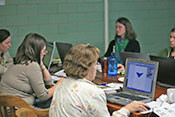 The Integration & Application Network's annual Science Communication Course was held at the Oxford Cooperative Laboratory in Oxford, Maryland this year. The course was hosted by EcoCheck, a partnership between IAN and NOAA Chesapeake Bay Office. This year's course was an intensive, one-day version that included the principles of science communication, hands-on activities and software instruction. The course was attended by NOAA, DNR, and UMCES employees and students as well as volunteer monitoring organizations working in collaboration with EcoCheck.
The Integration & Application Network's annual Science Communication Course was held at the Oxford Cooperative Laboratory in Oxford, Maryland this year. The course was hosted by EcoCheck, a partnership between IAN and NOAA Chesapeake Bay Office. This year's course was an intensive, one-day version that included the principles of science communication, hands-on activities and software instruction. The course was attended by NOAA, DNR, and UMCES employees and students as well as volunteer monitoring organizations working in collaboration with EcoCheck.
Two international NGOs invite IAN to science outreach conference in Zanzibar
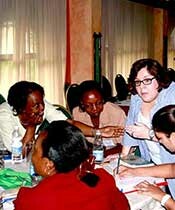 The International Foundation for Science (IFS) and the Western Indian Ocean Marine Sciences Association (WIOMSA) hosted a Science Outreach conference in Zanzibar, Tanzania the week of December 6-10. The scientists working in the WIO are faced with the on-going challenge of effectively communicating their research results to the local community of resource managers and resource users, many of whom are subsistence fishers. IAN's Bill Dennison, Jane Hawkey, and Kate Bentsen, along with Guiseppe DiCarlo from Conservation International were invited to conduct a one-day science communication workshop for the 70 participants, providing the scientists with tools to accomplish this task. For more details on the workshop, read Bill's Zanzibar series of blog posts.
The International Foundation for Science (IFS) and the Western Indian Ocean Marine Sciences Association (WIOMSA) hosted a Science Outreach conference in Zanzibar, Tanzania the week of December 6-10. The scientists working in the WIO are faced with the on-going challenge of effectively communicating their research results to the local community of resource managers and resource users, many of whom are subsistence fishers. IAN's Bill Dennison, Jane Hawkey, and Kate Bentsen, along with Guiseppe DiCarlo from Conservation International were invited to conduct a one-day science communication workshop for the 70 participants, providing the scientists with tools to accomplish this task. For more details on the workshop, read Bill's Zanzibar series of blog posts.
Course in communicating science effectively
The Integration and Application Network is conducting a 3-day course in communicating science effectively. The course is being held in Cambridge, Maryland, 1-3 May, 2012. The hands-on approach means that participants come away from the course with the technical skills to effectively communicate scientific information in a variety of communication products. Further details and online registration are available on the course website.Science Communication and Translation Course
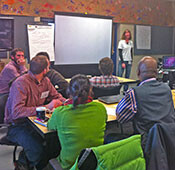 EcoCheck partnered with NOAA's Chesapeake Bay Office and the Chesapeake Bay National Estuarine Research Reserve's Coastal Training Program to facilitate a two-day workshop on effective science communication. Determining the key messages and development of the complete climate change story was the focus of the workshop. Participants learned effective science communication techniques, including layout and design principles, making conceptual diagrams, and recording effective videos. Participants attending the workshop were from academic institutions and state and federal agencies. IAN is running its next course from May 1-3 in Cambridge, MD. See the course website for more information and registration.
EcoCheck partnered with NOAA's Chesapeake Bay Office and the Chesapeake Bay National Estuarine Research Reserve's Coastal Training Program to facilitate a two-day workshop on effective science communication. Determining the key messages and development of the complete climate change story was the focus of the workshop. Participants learned effective science communication techniques, including layout and design principles, making conceptual diagrams, and recording effective videos. Participants attending the workshop were from academic institutions and state and federal agencies. IAN is running its next course from May 1-3 in Cambridge, MD. See the course website for more information and registration.
Science communication courses in Cambridge and Samoa
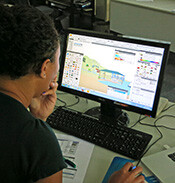 During May, IAN held science communication courses with participants from a wide variety of organizations, countries, and cultures. The course on the Horn Point campus in Cambridge, MD had students from Maryland Department of Natural Resources, US Environmental Protection Agency, Smithsonian Environmental Research Center, Conservation International, Sinclair Knight Merz (Australia), and graduate students and professors from a variety of local and regional universities. In Samoa, we taught courses for the Secretariat of the Pacific Regional Environment Programme and the Ministry of Natural Resources and Environment. Students in these courses were from Samoa, Fiji, Australia, New Zealand, and Great Britain.
During May, IAN held science communication courses with participants from a wide variety of organizations, countries, and cultures. The course on the Horn Point campus in Cambridge, MD had students from Maryland Department of Natural Resources, US Environmental Protection Agency, Smithsonian Environmental Research Center, Conservation International, Sinclair Knight Merz (Australia), and graduate students and professors from a variety of local and regional universities. In Samoa, we taught courses for the Secretariat of the Pacific Regional Environment Programme and the Ministry of Natural Resources and Environment. Students in these courses were from Samoa, Fiji, Australia, New Zealand, and Great Britain.
Research Experience for Undergraduates (REU) science communication course
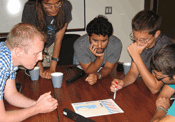 Students in the Research Experience for Undergraduates program (overseen by Maryland Sea Grant and funded by National Science Foundation) are now trained in science communication. Students residing at both Horn Point Laboratory and Chesapeake Biological Laboratory met with Caroline Wicks and Heath Kelsey at the National Socio-environmental Synthesis Center to draw conceptual diagrams and improve visual aides using effective science communication techniques. Additionally, they were given a walking tour of Annapolis.
Students in the Research Experience for Undergraduates program (overseen by Maryland Sea Grant and funded by National Science Foundation) are now trained in science communication. Students residing at both Horn Point Laboratory and Chesapeake Biological Laboratory met with Caroline Wicks and Heath Kelsey at the National Socio-environmental Synthesis Center to draw conceptual diagrams and improve visual aides using effective science communication techniques. Additionally, they were given a walking tour of Annapolis.
Multiple science communication courses taught in December
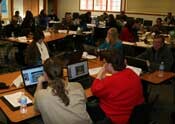 A full, 2.5-day science communication course was taught at the Delaware National Estuarine Research Reserve in Dover, Delaware in mid-December. The course included close to 30 participants, mostly from the Delaware Department of Natural Resources and Environmental Control. In contrast to other courses, this course had a lot of land-based research and restoration topics that were a focus of the participants' projects. A one-day science communication course was taught at the University of Maryland Eastern Shore as part of the Living Marine Resources Cooperative Science Center, a NOAA-sponsored partnership. The course was attended by 23 students and focused on conceptual diagrams and PowerPoint presentation skills.
A full, 2.5-day science communication course was taught at the Delaware National Estuarine Research Reserve in Dover, Delaware in mid-December. The course included close to 30 participants, mostly from the Delaware Department of Natural Resources and Environmental Control. In contrast to other courses, this course had a lot of land-based research and restoration topics that were a focus of the participants' projects. A one-day science communication course was taught at the University of Maryland Eastern Shore as part of the Living Marine Resources Cooperative Science Center, a NOAA-sponsored partnership. The course was attended by 23 students and focused on conceptual diagrams and PowerPoint presentation skills.
Course in communicating science effectively
The Integration and Application Network is conducting a three-day course in communicating science effectively. The course is being held in Cambridge, Maryland, 7-9 May, 2013. The hands-on approach means that participants come away from the course with the technical skills to effectively communicate scientific information in a variety of communication products. Further details and online registration are available on the course website.Science communication course for the MEES Environmental Management students
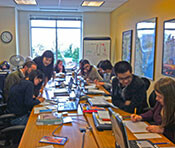 A one-day science communication course was conducted at the UMCES Annapolis office as part of the MEES Spring Semester Science for Environmental Management course being taught by Don Boesch and Bill Dennison. The course was attended by 12 PhD and Master's students within the MEES program and focused on conceptual diagrams and PowerPoint presentation skills, as well as a walking tour of downtown Annapolis.
A one-day science communication course was conducted at the UMCES Annapolis office as part of the MEES Spring Semester Science for Environmental Management course being taught by Don Boesch and Bill Dennison. The course was attended by 12 PhD and Master's students within the MEES program and focused on conceptual diagrams and PowerPoint presentation skills, as well as a walking tour of downtown Annapolis.
Course in communicating science effectively
The Integration and Application Network is conducting a three-day course in communicating science effectively. The course is being held in Cambridge, Maryland, 7-9 May, 2013. The hands-on approach means that participants come away from the course with the technical skills to effectively communicate scientific information in a variety of communication products. Further details and online registration are available on the course website.IAN Science Communication Course held at Horn Point Lab
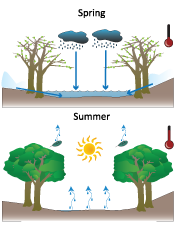 The Integration & Application Network (IAN) held its 2013 Science Communication Course open to all interested individuals. Participants came from all over the Mid-Atlantic region, and included post-docs, graduate students, academic faculty members, town government representatives, technical writers, and resource managers. All were interested in learning how to better communicate scientific principles and results to both scientist and non-scientist audiences. There was a wide range of backgrounds and interests among the participants: technical writing, wildlife ecology, Chesapeake Bay water quality, paleo-oceanography, outreach, and restoration ecology, to name a few. One participant summarized the 3-day course by saying, "A truly fantastic experience: informative, practical, and fun!".
The Integration & Application Network (IAN) held its 2013 Science Communication Course open to all interested individuals. Participants came from all over the Mid-Atlantic region, and included post-docs, graduate students, academic faculty members, town government representatives, technical writers, and resource managers. All were interested in learning how to better communicate scientific principles and results to both scientist and non-scientist audiences. There was a wide range of backgrounds and interests among the participants: technical writing, wildlife ecology, Chesapeake Bay water quality, paleo-oceanography, outreach, and restoration ecology, to name a few. One participant summarized the 3-day course by saying, "A truly fantastic experience: informative, practical, and fun!".
Recent IAN science communication courses
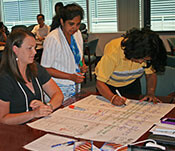 Students in Maryland Sea Grant's Research Experience for Undergraduates (REU) program completed a one-day course in science communication. Another one-day course was completed by interns at the NOAA-EPP Living Marine Resources Cooperative Science Center (LMRCSC). Both of these courses focused on effective science communication techniques, including conceptual diagrams and PowerPoint presentation skills. Professors and graduate students from the Institute of Marine and Environmental Technology (IMET) participated in a 3 day course which focused on photo editing, conceptual diagram creation, and layout of newsletters and posters. Learn more about our science communication courses and arrange one for your organization.
Students in Maryland Sea Grant's Research Experience for Undergraduates (REU) program completed a one-day course in science communication. Another one-day course was completed by interns at the NOAA-EPP Living Marine Resources Cooperative Science Center (LMRCSC). Both of these courses focused on effective science communication techniques, including conceptual diagrams and PowerPoint presentation skills. Professors and graduate students from the Institute of Marine and Environmental Technology (IMET) participated in a 3 day course which focused on photo editing, conceptual diagram creation, and layout of newsletters and posters. Learn more about our science communication courses and arrange one for your organization.
Course in communicating science effectively
The Integration and Application Network is conducting a three-day course in communicating science effectively. The course is being held in Cambridge, Maryland, 12-14 May, 2014. The hands-on approach means that participants come away from the course with the technical skills to effectively communicate scientific information in a variety of communication products. Further details and online registration are available on the course website. Registration closes on May 7th.On the Horizon . . .
- A new course, Communicating Science Effectively, will be offered by the Integration and Application Network in fall semester 2015. This course will focus on developing effective strategies for communicating scientific findings using a variety of data visualization tools, including conceptual diagrams, informative maps, photographs, and video clips. This 3-credit course will be offered through the University of Maryland Marine, Estuarine, Environmental Sciences graduate program. Please stay tuned for registration information!
- IAN staff will be attending River Rally 2015, a gathering of the River and Watershed Conservation Community, in Santa Ana Pueblo, New Mexico May 1-4.
Workshops are Beautiful: Data visualization in NYC
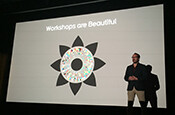 Jane Thomas and Brianne Walsh traveled to New York City to participate in a one-day workshop on data visualization. The workshop was presented by David McCandless, writer, data journalist, designer, and author of the blog and book Information is Beautiful. The workshop outlined four steps of creating effective and dynamic data visualizations: concepting and generating good, interesting ideas, researching and curating juicy data, executing and selecting appropriate and effective visualizations, and designing and beautifying impactful charts and diagrams. The workshop provided a fun, hands-on, insightful introduction and approach to the development of infographics, and IAN hopes to incorporate David's tips and tricks into our own design process.
Jane Thomas and Brianne Walsh traveled to New York City to participate in a one-day workshop on data visualization. The workshop was presented by David McCandless, writer, data journalist, designer, and author of the blog and book Information is Beautiful. The workshop outlined four steps of creating effective and dynamic data visualizations: concepting and generating good, interesting ideas, researching and curating juicy data, executing and selecting appropriate and effective visualizations, and designing and beautifying impactful charts and diagrams. The workshop provided a fun, hands-on, insightful introduction and approach to the development of infographics, and IAN hopes to incorporate David's tips and tricks into our own design process.
Recent IAN science communication courses
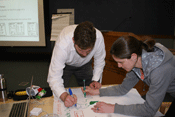 A 2.5-day science communication course was taught at the Horn Point Laboratory for participants in the John A. Knauss Marine Policy Fellowship program. Participants learned effective science communication techniques, including layout and design principles, conceptual diagrams, and presentation skills. Participants in the 2015 Maryland Sea Grant's Research Experience for Undergraduates (REU) program completed a one-day course in science communication. The course focused on effective science communication techniques, including conceptual diagrams and presentation skills, and included a walking tour of downtown Annapolis, with a special pit stop for ice cream on such a warm June day!
A 2.5-day science communication course was taught at the Horn Point Laboratory for participants in the John A. Knauss Marine Policy Fellowship program. Participants learned effective science communication techniques, including layout and design principles, conceptual diagrams, and presentation skills. Participants in the 2015 Maryland Sea Grant's Research Experience for Undergraduates (REU) program completed a one-day course in science communication. The course focused on effective science communication techniques, including conceptual diagrams and presentation skills, and included a walking tour of downtown Annapolis, with a special pit stop for ice cream on such a warm June day!
On the Horizon...
MEES 708T: Science Visualization will be offered this spring through the Marine Estuarine Environmental Sciences Graduate Program. The 2 credit class will be taught by Dr. Bill Dennison and a team of IAN Science Communicators. For more information you can view the syllabus. Non-students can register here.IAN offers new science communication course
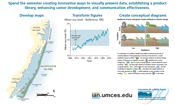 The Integration and Application Network (IAN) is offering a new science communication course this year. This semester-long course in Science Visualization will be taught through UMCES as a MEES course by Dr. Bill Dennison, and science communicators at IAN. This hands-on course will teach students data visualization techniques and allow them to build a portfolio of graphs, photographs, conceptual diagrams, and maps, to be used in reports, posters, and oral presentations. The course started January 28th with an introduction to Science Visualization. There is still space available for people who are interested in signing up.
The Integration and Application Network (IAN) is offering a new science communication course this year. This semester-long course in Science Visualization will be taught through UMCES as a MEES course by Dr. Bill Dennison, and science communicators at IAN. This hands-on course will teach students data visualization techniques and allow them to build a portfolio of graphs, photographs, conceptual diagrams, and maps, to be used in reports, posters, and oral presentations. The course started January 28th with an introduction to Science Visualization. There is still space available for people who are interested in signing up.
New Science Visualization course
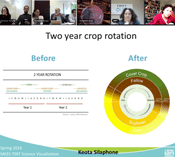 IAN is offering a new 2 credit graduate course in Science Visualization through the Marine, Estuarine and Environmental Science program this semester. The course employs a 'flipped classroom' in which lectures are recorded prior to class and made available on the Integration and Application Network YouTube channel. The IAN team of science communication practitioners is teaching this course. Classtime discussions are summarized in a weekly blog, posted on Wednesdays on the IAN website. Students in this hands-on course will be creating conceptual diagrams, data visualizations, maps and photographs in the initial section. The second section of the course focuses on storyboarding and assembling posters, reports, web materials and oral presentations. Course materials (recorded lectures and blogs) are being made available to anyone interested in developing more effective science visualization skills.
IAN is offering a new 2 credit graduate course in Science Visualization through the Marine, Estuarine and Environmental Science program this semester. The course employs a 'flipped classroom' in which lectures are recorded prior to class and made available on the Integration and Application Network YouTube channel. The IAN team of science communication practitioners is teaching this course. Classtime discussions are summarized in a weekly blog, posted on Wednesdays on the IAN website. Students in this hands-on course will be creating conceptual diagrams, data visualizations, maps and photographs in the initial section. The second section of the course focuses on storyboarding and assembling posters, reports, web materials and oral presentations. Course materials (recorded lectures and blogs) are being made available to anyone interested in developing more effective science visualization skills.
First semester-long course in Science Visualization completed
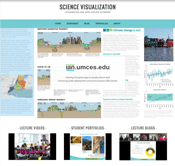 This spring IAN offered a new course in Science Visualization through the Marine-Estuarine Environmental Science graduate program of the University System of Maryland. The class utilized a 'flipped' or 'inverted' classroom in which lecture content was provided before class time via YouTube videos. Class period was used for discussion and review of student's work. The course generated 18 video lectures/tutorials, 13 blog posts and a course website in which all of the videos, blogs, and student portfolios are available. Planned future iterations of the course will be offered to our collaborators in the NGO community and partner agencies.
This spring IAN offered a new course in Science Visualization through the Marine-Estuarine Environmental Science graduate program of the University System of Maryland. The class utilized a 'flipped' or 'inverted' classroom in which lecture content was provided before class time via YouTube videos. Class period was used for discussion and review of student's work. The course generated 18 video lectures/tutorials, 13 blog posts and a course website in which all of the videos, blogs, and student portfolios are available. Planned future iterations of the course will be offered to our collaborators in the NGO community and partner agencies.
IAN offers Science Visualization course to practitioners
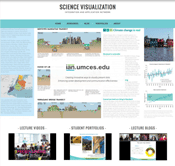 After the successful completion of IAN's first semester-long science visualization course, a similar class will be offered this fall to practitioners. This will be a great opportunity for our partners and collaborators to learn valuable science visualization techniques from IAN's professional Science Communicators. Class will meet once a week using GoToMeeting, an online platform that will enable students to take the class from anywhere. A "flipped classroom" will also be employed, where lecture material is prepared by instructors and viewed by students ahead of class time. Students will be building their own portfolio through weekly homework and will receive constructive feedback during both class time and online forums/platforms. For more information on the course, check out the webpage from last semester's class!
After the successful completion of IAN's first semester-long science visualization course, a similar class will be offered this fall to practitioners. This will be a great opportunity for our partners and collaborators to learn valuable science visualization techniques from IAN's professional Science Communicators. Class will meet once a week using GoToMeeting, an online platform that will enable students to take the class from anywhere. A "flipped classroom" will also be employed, where lecture material is prepared by instructors and viewed by students ahead of class time. Students will be building their own portfolio through weekly homework and will receive constructive feedback during both class time and online forums/platforms. For more information on the course, check out the webpage from last semester's class!
Reserve your spot in the next Science Visualization course!
Registration for IAN's Science Visualization course (beginning September 7, 2016) is now open. This semester long course virtual will be taught over GoToMeeting. Get more information and register today by visiting IAN's Science Communication Course page.Reserve your spot in the next Science Visualization course!
Registration for IAN's Science Visualization course is open until September 12, 2016. This semester-long virtual course will be taught over Blue Jeans, an online video conferencing service. Get more information and register today by visiting IAN's Science Communication Course page.Course in Communicating Science Effectively held in Edmonton, Alberta
 In September, IAN traveled to Edmonton, Alberta to facilitate a course in Communicating Science Effectively. Integrated assessment and the report card process were the focus of the two-day course. Participants learned the five steps in creating a report card, and throughout the process gained the principles of effective science communication. The course was sponsored by the Alberta Biodiversity Monitoring Institute, and participants were from academic institutions, government agencies, and land management consultants. The diverse backgrounds and breadth of knowledge from participants knowledge from participants contributed to an engaging course and great discussions over the two days.
In September, IAN traveled to Edmonton, Alberta to facilitate a course in Communicating Science Effectively. Integrated assessment and the report card process were the focus of the two-day course. Participants learned the five steps in creating a report card, and throughout the process gained the principles of effective science communication. The course was sponsored by the Alberta Biodiversity Monitoring Institute, and participants were from academic institutions, government agencies, and land management consultants. The diverse backgrounds and breadth of knowledge from participants knowledge from participants contributed to an engaging course and great discussions over the two days.
Science communication courses in Narragansett, RI and Cambridge, MD
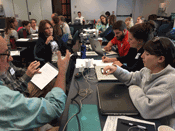 IAN conducted two Communicating Science Effectively courses in October. Jane Thomas, Jane Hawkey, and Dylan Taillie travelled to Narragansett, RI on October 4-5 to teach a course to participants associated with the Narragansett Bay National Estuarine Research Reserve. The course was taught at the Coastal Institute at the University of Rhode Island Bay Campus. Participants came from local, state, and federal government agencies as well as non-government organizations and universities. On October 11-12, IAN staff Alex Fries, Caroline Donovan, Simon Costanzo, Jane Thomas, and Jane Hawkey taught the course in Cambridge, MD to the Sea Grant Class of 2016 Knauss Fellows. Participants in both courses learned about making conceptual diagrams, giving effective presentations, and producing printed media.
IAN conducted two Communicating Science Effectively courses in October. Jane Thomas, Jane Hawkey, and Dylan Taillie travelled to Narragansett, RI on October 4-5 to teach a course to participants associated with the Narragansett Bay National Estuarine Research Reserve. The course was taught at the Coastal Institute at the University of Rhode Island Bay Campus. Participants came from local, state, and federal government agencies as well as non-government organizations and universities. On October 11-12, IAN staff Alex Fries, Caroline Donovan, Simon Costanzo, Jane Thomas, and Jane Hawkey taught the course in Cambridge, MD to the Sea Grant Class of 2016 Knauss Fellows. Participants in both courses learned about making conceptual diagrams, giving effective presentations, and producing printed media.
Science Communication Course at IMET
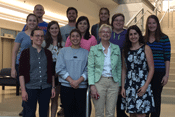 On August 20-21 2018, Emily and Alex taught a science communication course for the graduate students at IMET in Baltimore, MD. This course not only introduced the students to science communication principals and best practices, but also included modules to learn Adobe software and apply that knowledge to the students' research. Their research ranged from striped bass and marine sponges to microplastics, with much of the work having real-world applications. Students enjoyed learning how to make their own symbols, and one student in particular created a new stingray symbol that will soon be incorporated into the IAN symbol library.
On August 20-21 2018, Emily and Alex taught a science communication course for the graduate students at IMET in Baltimore, MD. This course not only introduced the students to science communication principals and best practices, but also included modules to learn Adobe software and apply that knowledge to the students' research. Their research ranged from striped bass and marine sponges to microplastics, with much of the work having real-world applications. Students enjoyed learning how to make their own symbols, and one student in particular created a new stingray symbol that will soon be incorporated into the IAN symbol library.
How to make an ecosystem health report card
Are you interested in learning the complete report card process to leverage real environmental change in your area? Join IAN's online science communication course and get familiar with all the steps from stakeholder mapping and engagement and conceptualizing ecosystem function to selecting indicators and benchmarks, analyzing data, and communicating results. Sign up or learn more here.A one-day course in Communicating Science Effectively with U.S. EPA Region 1
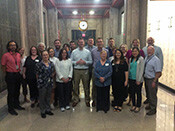
Bill Dennison and Brianne Walsh traveled to Boston, Massachusetts on September 12-14 to teach a one-day course "Communicating Science Effectively" for U.S. EPA Region 1 staff at their office in downtown Boston. While the 25 participants had differing backgrounds and roles within the EPA, they each had one goal for the workshop: how to communicate the complex, and important data being collected into usable information for a variety of audiences. We packed a lot of material the one-day course: data visualization, conceptual diagrams, and narratives and storytelling. We look forward to following up in a few months via webinar to share how participants have been able to apply new skills in their own work!
Connect with IAN at the Chesapeake Film Festival
IAN will be helping to support the 2018 Chesapeake Film Festival (CFF) which runs October 11-14, 2018 at various sites on Maryland's Eastern Shore. This year's festival boasts a wide range of excellent stories. IAN will also be contributing to CFF's presence at the Waterfowl Festival (November 9-11, 2018 in Easton, Maryland) by helping to screen a series of environmental shorts.Professional certificate opportunity and environmental management course now available online

On February 15, we launched our first professional certificate program in Environmental Management for Sustainability on EdX, an online learning platform for open online courses. Four courses make up the certificate. All courses are self-paced and available in five languages (English, Spanish, Filipino, Japanese, and Hindi). A professional certificate is available for verified learners, and all content is available for free. For more information, visit our certificate page on EdX.
Online courses available: become an environmental steward

In mid-February, we launched the first course, Strategic Communication for Sustainability Leaders, in the Environmental Management for Sustainability professional certificate program on edX. On April 26, we are excited to launch the second course in the certificate, Storytelling with Data Using Socio-environmental Report Cards. Join the more than 900 learners that are currently enrolled in these two courses, and consider becoming a verified learner to gain access to additional content and to earn a professional certificate. For more information, visit our certificate page on EdX.
Professional Certificate in Environmental Management for Sustainability courses
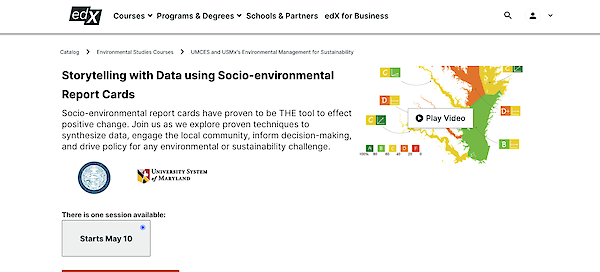
We are excited to announce that our Storytelling with Data Using Socio-environmental Report Cards course will be live this upcoming Monday, May 10th! This is our second course in the Professional Certificate in Environmental Management for Sustainability. Pro tip: consider enrolling as a verified learner to have access to bonus materials and extra resources.
Socio-environmental report cards have proven to be THE tool to effect positive change. Enroll here today, and join us as we explore proven techniques to synthesize data, engage the local community, inform decision-making, and drive policy for any environmental or sustainability challenge.